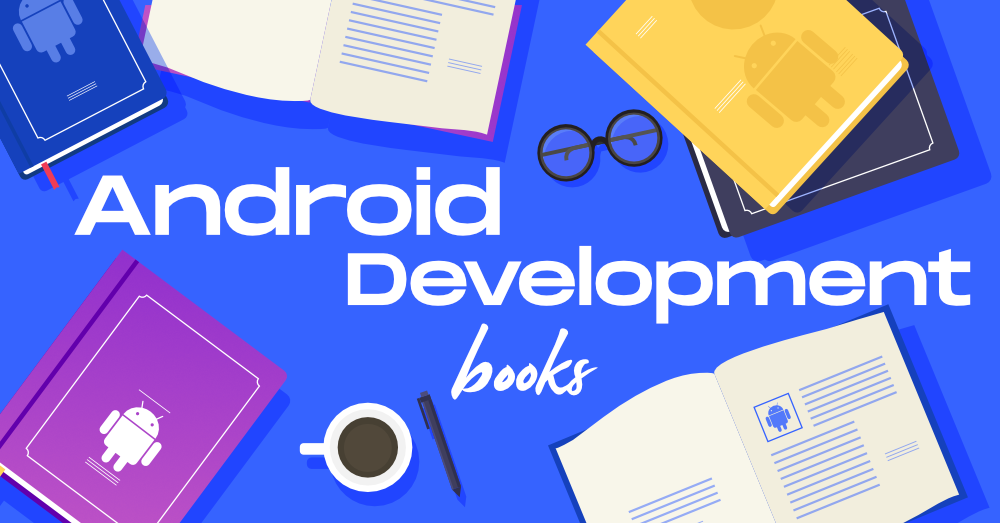Software
The 8 Best Books for Android App Development

The best Android app development books will help you realize your vision. There are about 2.5 billion Android users in the world. These books will help you with topics like Java programming, UX uploading, and everything in between.
For a more sample-based selection, we recommend Hands-On Android at Amazon. Each chapter covers a different project, while an alternative like Android Programming: The Big Nerd Ranch Guide, also on Amazon, focuses primarily on the Java coding side.
When you choose one of the best Android app development books, the possibilities for your future app are endless. Be sure to read our guide on how to make money with app development if you want to make money fast.
Ideal for programmers with Java experience: Android Programming: The Big Nerd Ranch Guide
Big Nerd Ranch has built its reputation providing intensive week-long developer startup courses, and the company has distilled that experience into a small selection of programming tutorials.
It requires a reasonable knowledge of Java so that it can focus entirely on Android-specific elements. The company also offers a Java programming guide for those unfamiliar with the subject.
Using Android Studio, the book explains the concepts with sample applications that are expanded and improved in each chapter. The code is explained line by line, as well as what is going on and why it is being handled this way.
It’s a large and detailed book, thanks in part to the many screenshots and code snippets used to explain each section. With a strong emphasis on basic and intermediate concepts, if you’re a Java programmer new to Android development, this guide from Big Nerd Ranch is the right choice for you.
The Best All-rounder: Android Studio 3.0 Development Essentials – Android 8 Edition
Neil Smyth Android Studio 3.0 Development Essentials is a great, complete introduction to building Android apps, with over 700 pages covering almost everything you need to know.
From the development environment to architecture and design, from printing to database management, multimedia and more, the book (fully updated for Android 8 and Android Studio 3) covers everything in great detail and provides a solid knowledge base to build on in the future.
The guide, which contains many code samples and descriptions, is intended for those who already have some programming experience in Java. It’s especially effective at setting up and using Android Studio, including setting up virtual test devices, and it also covers things like map deployment and application submission to the Play Store, which are often little covered in other guides. All in all, it’s an ideal one-stop shop for budding Android developers.
Best for Visual Students: Android Development First: A Brain-Friendly Guide
Head First takes an unconventional approach with its guides. The goal is to help readers learn, understand, and retain new concepts, as the emphasis is heavily on images and everyday language rather than dry, heavy text.
The company’s Android development is no exception, replete with diagrams, flowcharts, and comments to reinforce the point. Redundancy is an integral part of the Head First approach, where important material is mentioned multiple times in different ways to stay true.
All these photos and iterations make this a huge book – at over 900 pages it can seem daunting at first and is intended as a replacement for an entire class rather than a quick start guide.
You need good Java skills, but you don’t have to be an expert yet. There are many practical exercises and the tasks are at the end of each chapter. These are the key aspects of the guide’s approach – you will rarely find yourself reading the material and moving on.
If you’re a visual learner or have trouble retaining information when presented as a dense wall of text, Head First Android Development is a welcome change.
Best for a Carefree Approach: Android Development for Talented First-timers: A Beginner’s Guide
Regardless of whether you consider yourself a gifted primate or not, Antonis Tsagaris’s Android development for gifted primates is an interesting alternative. The author often uses strong language and is not afraid to express his opinion, suggesting his guide as an alternative to “dry, humorless, life-sucking programming books written by an automaton”.
This relatively short and affordable book is aimed at beginners and requires only basic experience in Java or a similar programming language to get started. Available in print or as an e-book, it follows the reader through the development of Android, from the absolute basics to the completion of the first application.
Along the way, you’ll learn how to set up the Android Studio development environment, create an interactive user interface using XML, let different Android components communicate with each other, and more.
If you’re easily offended, you might want to check out other Android development guides, but if not, this is a fun and useful starting point.
Ideal for quick answers: The Android Cookbook: Problems and Solutions for Android Developers
Rather than trying to be a comprehensive guide to Android development, the Android Cookbook focuses on providing quick answers to common problems.
More than 230 “recipes” e.g. user interfaces, multimedia and positioning services, as well as hardware-specific issues such as cameras and sensors, the guide is aimed at those who are already quite familiar with the development of Android devices.
About 40 developers have contributed to the book, and it benefits from their diverse perspectives and experiences. Each recipe comes with sample code that you can use in your projects, depending on whether it’s a snippet or a fully functional solution.
Since it is designed to be installed and removed according to your current needs, the size of the book (over 700 pages) is not too large. If you’re looking for simple answers to complex Android development problems, this cookbook deserves a place on your desktop.

Best for learning Kotlin: Programming Kotlin: The Big Nerd Ranch Guide
Ever since Google announced full support for the Kotlin programming language in Android Studio, it has quickly become the next big thing in Android development circles. Many current Android programmers are switching to a system that is in many ways interoperable with Java, but more tightly typed and with dozens of useful new features.
The Big Nerd Ranch has written the definitive book on coding in version 1.2 of this relatively new language, and takes the same hands-on approach as their other books and respected bootcamps.
The guide is aimed at experienced Java developers who want to learn Kotlin and covers all the key concepts and APIs of the language as well as the IDEA development environment.
Starting with the first principles and then diving into the linguistic combination of object-oriented and functional programming methods, this is the ideal way to start using Kotlin for both Android and other platforms.
Best for Rapid Development: Practical Android: 14 Complete Projects with Advanced Techniques and Approaches
The author of Practical Android is an experienced Android instructor and this guide is based on some of his most popular course content. Each chapter builds on a specific concept, from connectivity to push notifications, and takes a closer look at the best way to implement it in your apps.
With at least one complete project in each chapter, it’s easy to follow even complex topics like slow loading or Android audio API management and use the appropriate sections of example code.
The author explains both why and how and supports his approach with links to relevant material elsewhere. Users of the book are expected to already have Java skills and experience with Android development – this is not a step-by-step guide for beginners.
















